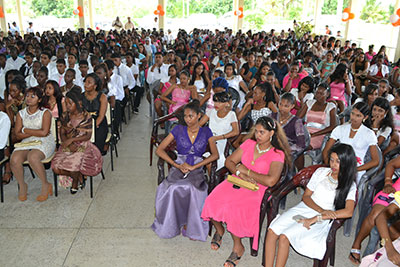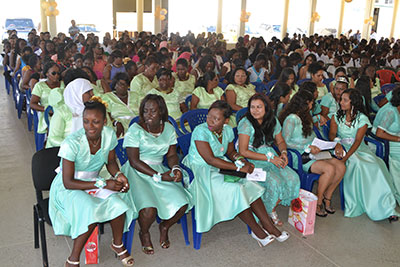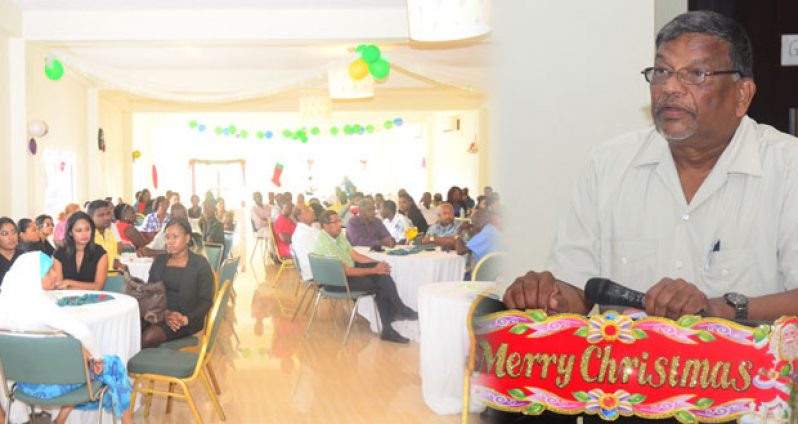“2014 has been a successful year for the BIT (Board of Industrial Training) programme”, Labour Minister, Dr. Nanda Gopaul said during his year-end review yesterday.
The Government has, over the years, been working to ensure that all Guyanese have a chance to be trained in some aspect of work, and this training is being administered by the Board of Industrial Training, which has been providing a good opportunity to persons to qualify themselves with various skills.
Some 2,736 persons graduated from the BIT programme in 2014, compared to approximately 3,000 persons in 2013; while more than 8,000 persons have accessed training under the programme since its introduction in 2005.
The work force is empowered annually by skilled persons who have undergone training under BIT.
Some 2,736 persons graduated from the BIT programme in 2014, compared to approximately 3,000 persons in 2013; while more than 8,000 persons have accessed training under the programme since its introduction in 2005.

Guyana’s BIT programme was hailed by Mexico and Colombia in 2013 as a model for youth training and for reducing unemployment. The programme consists of on-the-job training and exposure to life skills educational classes. The youths who are targeted are between the ages of 15 and 25. Most of them do not have the requisite CSEC qualifications to enter the job market, or may not have completed secondary education.
Speaking at his year-end review held at Park Vue Hotel, Dr Gopaul explained that, during the year 2014, some 2,736 persons were trained in various regions of the country, 1,469 of whom were females and 1,267 of whom were males. In areas such as Engineering, some 839 persons graduated, while Electrical graduated 176; Building Construction, 124; Information Technology and Clerical Work, 783; Medical Assistant, 209; Forestry 41, and Home Economics 564.
In Region Two, 100 persons were trained; in Region Three, 349 persons; in Region Four, 641 persons; in Region Five, 343 persons; in Region Six, 907 persons; in Region Seven, 138 persons; in Region Nine, 83 persons; and in Region Ten, 175 persons.

“We can look at what the Board of Industrial Training has been doing, with more and more persons offering their services, having received skilled training,“ he said, while noting that these same now skilled workers will be able to assist in moving the country forward. “And that’s the reason why the interface between the Man Power Agency and the Board of Industrial Training becomes all the more important, since unskilled workers will no longer be available,” the Labour Minister noted.
The Single Parents’ Training Programme (SPTP) saw 434 persons certifying themselves in 2014, compared to 453 persons in 2013.
The Apprenticeship Programme (AP) gained a new Apprentice Master in 2014 with the signing on of the Guyana Water Inc. (GWI) to the programme, the Labour Minister related.
Dr. Gopaul explained that, in each region, the BIT programme would have done something differently, since it has to cater for the specifics in the area. In Region 2, Pomeroon-Supenaam, the programme graduated 15 persons in heavy-duty equipment operation, and that programme was extended to far flung communities, including Capoey.
In Region 3, Essequibo Islands-West Demerara, the BIT programme increased its reach to Leguan and Wakenaam by establishing an Information Technology (IT) Training programme in Leguan and a block making programme in Wakenaam. In Region 4, Demerara-Mahaica, 16 officers of the Guyana Police Force were trained in heavy duty equipment operation.
There was also collaboration with the Guyana Women’s Leadership Institute to develop capacity building and entrepreneurial skills for women in sewing, information technology, catering and cosmetology. In Region 4, these persons amount to 77.
Community-based health care programmes at health centres and hospitals were done in Region 5, Mahaica-Berbice, to provide critical skills needed for the Health sector in this area. BIT collaborated with the Bath Skills Training Centre to provide training in cosmetology, catering, information technology and garment construction, and 121 persons were certified.
In 2014, the BIT embarked upon evening programmes and collaborated with the Guyana Training Centre in Port Mourant in fitting and machining, electrical installation, motor vehicle servicing and repairs, refrigeration, welding and fabrication, and supervisory management. In Region 6, East Berbice-Corentyne, the BIT extended its services to persons from the remote communities of Orealla and Siparuta. Twenty-four persons have since graduated from these areas in Heavy Duty Equipment Operation, and a second batch of 27 persons is currently being trained.
Region 7, Cuyuni-Mazaruni, commenced training of Heavy Duty Equipment Operators for the first time in conjunction with the Regional Democratic Council. This region also commenced training programmes in mechanical training, garment construction, health services, catering, and clerical trades in the hinterland communities of the Upper Mazaruni.
Kako had 21 persons trained, Kamarang 23; and Waramadong 20.
Region 9, Upper Takutu-Upper Essequibo, was yet another area that, for the first time, commenced training under the BIT. Residents of communities such as Central Annai, Wowetta, Kwatamang and Rupertee were trained in garment construction, catering, block-making and information technology. The total number of persons trained in this area amounted to 83.
In Region 10, Upper Demerara-Upper Berbice, 18 persons graduated in heavy-duty equipment operation, and it can be noted also that this programme was extended to Kwakwani.
Dr. Gopaul emphasised that the National Training Project for Youth Empowerment (NTPYE) is slated in 2015 to train a total of 3000 persons countrywide in various occupational areas, while the Single-Parent Training Progamme (SPTP) will train a total of 450 persons.
(By Rebecca Ganesh)



.jpg)








